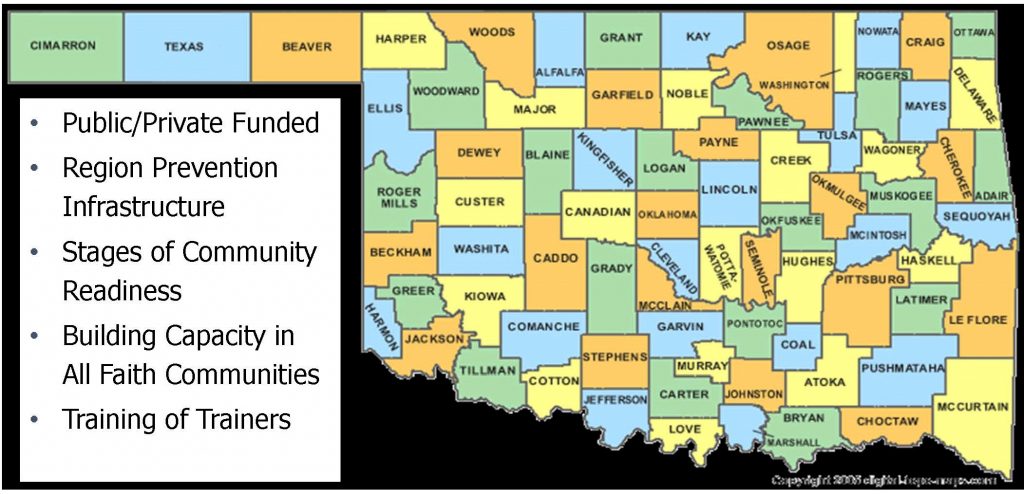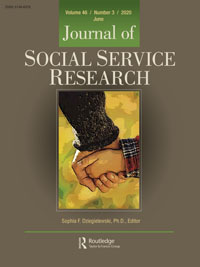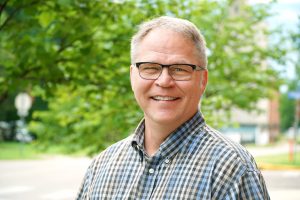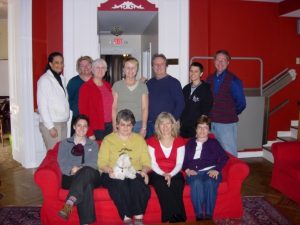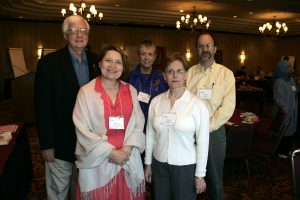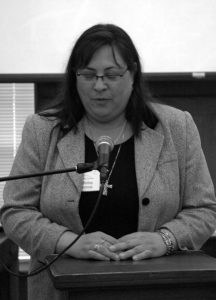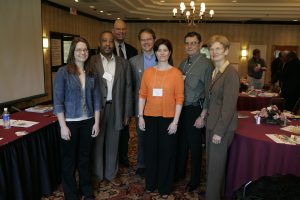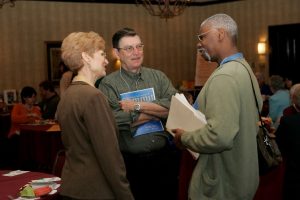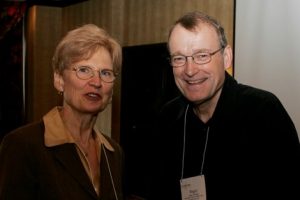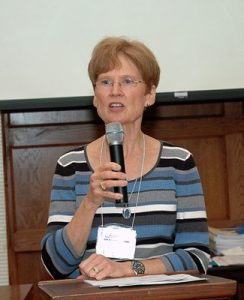Our History
Faith Partners Today
With denominational, community coalition, ministerial association, local agency, and state and federal partnerships Faith Partners continues to mobilize the faith community to become effective in the prevention of substance abuse issues and to provide addiction recovery support.
We have developed three service delivery systems based on different levels of approach including congregational (distance learning model), community (a training series for a network of local congregations), and statewide (utilizing the infrastructure of the state system, i.e. Regional Prevention Centers to engage the faith community).
A parachurch organization, operating outside established religious boundaries, Faith Partners is able to engage congregations regardless of their specific beliefs and doctrines. Our training model focuses on the best practices of faith and science meeting individuals in our shared humanity and desire for healing. We have now trained nearly 1,000 teams in 29 states from 23 different faith traditions.
Faith Partners has had a rich and interesting history. Please see below a number of the highlights that has informed our work and lead our journey to this place in time. We have a number of new projects in the hopper including translating our ministry guides into Spanish, re-structuring our training series into virtual format, piloting a distance learning model, initiating a new research project, and beginning a new area coordinator’s network meeting.
October 2020
Re-launch of Faith Partners Website
Faith Partners was honored and blessed to have had the service of Rick Drewien as a team facilitator at Sacred Tapestry United Methodist Church in Marietta, Georgia and as our volunteer webmaster for well over a decade. He was a faithful servant to Faith Partners and to many in recovery and saw the importance of marrying his faith and recovery life together through his service work. He was a prolific writer, writing numerous articles for the website and implemented the original design for the Faith Partners website. He passed away in 2018, after a number of health complications.
Faith Partners plans to dedicate a section in the archives for his numerous articles in our newly designed website. Rick will continue to live on through his articles on the Faith Partners website.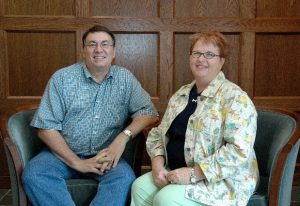
July 2020
Second Research Article Submitted
In partnership, South Southwest Addiction Technology Transfer Center (SSW ATTC) and Faith Partners submitted its second research article to the Journal of Religion and Health on the Faith Partners congregational addiction team model. The primary authors Dr. Dnika Travis and Dr. Richard Spence theorized in order to expand the number of faith communities actively involved in supporting resilience to and recovery from substance use disorders, more knowledge is needed regarding effective methods to recruit these congregations to become engaged in deliberate programming focused on building capacity and change readiness to address substance use disorders.
Diffusion of innovations theory posits several attributes of innovations that influence rapidity of diffusion. One key attribute is that of compatibility as defined by the degree to which the innovation is perceived to be consistent with community values and needs. (Rogers, 2003) The RESOURCES and COMMUNITY variables are directly related to consistency with congregational values, and the IMPORTANCE variable addresses perceived congregational need. Thus the influence of the three covariates of the study support may be explained in part by the diffusion of innovations theory.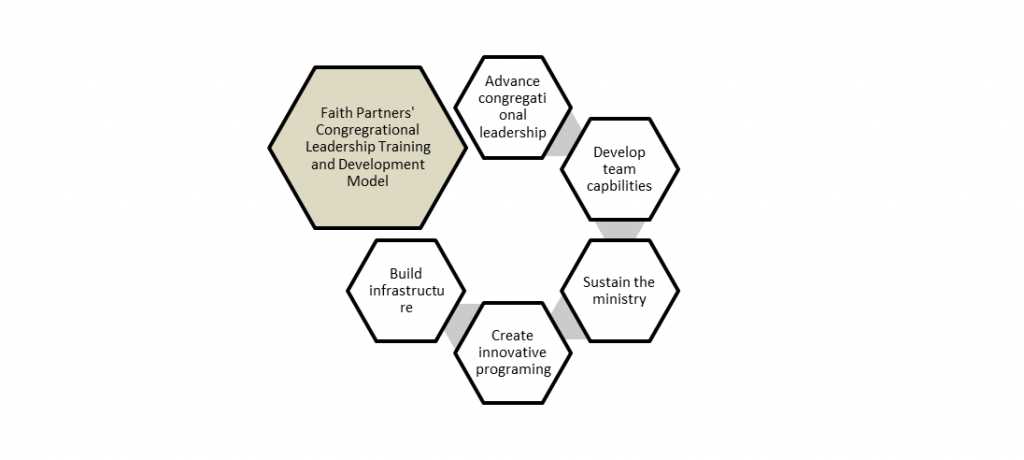
September 2014
Oklahoma Statewide Logic Model Developed
In 2014, the SAMHSA’s Center for the Application of Prevention Technologies (CAPT) Southwest Resource Team provided technical assistance to Faith Partners to develop a Faith Partners Statewide Logic Model. The Logic Model captures the steps to develop a statewide effort to equip the faith communities to help decrease substance abuse in the State of Oklahoma. Faith Partners continues to build capacity within the faith community to engage in systematic, evidence-based community substance abuse prevention and recovery support efforts. Faith Partners’ goal is to expand and improve this statewide model and replicate with other interested states starting as a local pilot project or at a statewide level.
2012-2016
First Statewide Project
Faith Partners’ first Statewide Project was with the Oklahoma Department of Mental Health and Substance Abuse Services (ODMHSAS). It was made possible by funding from the State of Oklahoma and a private funder Jack Turner whose family had been directly affected by substance use disorders. Although, the model works with both prevention and recovery support resources – we decided to We looked at working either with the prevention or recovery support side of the ODMHSAS
2012
Re-Branding of Faith Partners
Thanks to a generous gift from Jud Wyatt of Austin, Texas, Faith partners was able to rebrand itself from their logo to all their products and services. Jud became a board member in 2012 and served for three years sharing his passion for the faith community and his business acumen in making Faith Partners more accessible and profitable.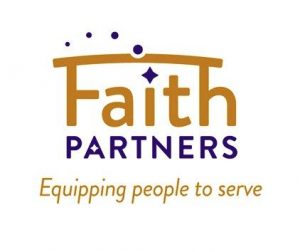
2012
First Research Article Published
Faith Partners with the help of the South Southwest Addiction Technology Transfer Center (SSWATTC) out of the School of Social Work at the University of Texas publishes its first research article, entitled, The Faith Community, Substance Abuse, and Readiness for Change: A National Study, in the Journal of Social Service Research as a result of their work with Substance Abuse Mental health Service Administration (SAMHSA) Service to Science (S2S) Evaluation Enhancement Grant.
October 2011
New Executive Director
Drew Brooks is the Executive Director of Faith Partners, after working with Faith Partners since 1999 in the roles of National Project Coordinator and Minnesota Area Coordinator. He also has been involved with congregational lay leadership in music, youth, caring, small group, and addiction ministries.
Drew has worked in the prevention, treatment, recovery, and public health fields for over thirty-seven years with Hazelden, Johnson Institute and other organizations providing training and consultation with faith communities, schools, and community organizations across the country. He has worked with community coalitions focusing on resiliency models and environmental prevention strategies for underage drinking and marijuana use.
He recently served as co-chair of the Austin Recovery-Oriented Systems of Care (ROSC) Initiative and a member of the Substance Abuse and Mental Health Services Administration’s (SAMHSA) Bringing Recovery Supports to Scale Technical Assistance Center Strategy (BRSS TACS) twelve-person team to assist the State of Texas in designing and implementing recovery-oriented supports, services, and systems.
2009
Faith Partners Re-established
In 2009, Faith Partners Inc. ended the collaboration with Johnson Institute with Rev. Dr. James White (Center of picture) taking the leadership position.
Now with more than twenty-five years in development, the Faith Partners congregational team approach is active and thriving, serving in a growing number of faith traditions.
2008
SAMHSA S2S Evaluation Enhancement Grant
2007-2008
UMC SPSARV First to Implement Faith Partners Model Denominationally
After the endorsement United Methodist Church (UMC) General Board of Church & Society (GBCS), a partnership was developed in 2007 with the General Board of Global Ministries (GBGM) to training UMC congregations across the United States. We worked in three of the five Jurisdictions (Regions). Present in the photograph were the Faith Partners and SPSARV staff for the Team Training in Charlotte, North Carolina.
The connectional nature of the United Methodist Church enables it to publicize and coordinate Faith Partners training events from within the hierarchy. This showcase partnership between the United Methodist Church and Rush Center (Faith Partners) provided encouragement for other denominations to address problems of alcoholism and addiction from within their religious structures, spurring their congregations forward in the journey toward hope, healing, and wholeness. Next to endorse Faith Partners were the Presbyterians. Conversation of collaboration were also initiated with Roman Catholic, United Church of Christ, Lutheran, and Unitarian Universalists faith traditions.
May 2007
Initiate Jewish Project in Florida
During the early years of development, the Faith Partners approach was adopted primarily by churches within the Christian faith. The model, however, was never intended as a solution exclusively for Christians, but for all faiths. The 2005 Summit was a significant breakthrough, with its inclusion of participation by Jewish and Muslim American, and post-Summit activities have reached outward, making noteworthy strides among the other monotheistic faiths.
A crucial pivotal phone call came to the Rush Center (Faith Partners) from Boca Raton, Florida in late 2005. The caller had been exploring ways to aid synagogues in dealing with addiction/recovery issues and she wanted to discuss the Faith Partners approach. Could it work for a Jewish congregation? How much adaptation might be required?
The caller, Mindy Agler (pictured here), a rabbi’s wife and licensed mental health counselor/addiction therapist, was an avid proponent of congregational involvement with this issue. Now she wanted to do more. Sharing many goals, Aglet began collaborating with the Rush Center (Faith Partners) and created the Jewish Congregational Project, a pilot program funded by grants from two concerned Jewish families, involving multiple synagogues in South Florida. Agler joined the Rush Center staff as a consultant and revised promotional materials and training manuals to include language, experience and wisdom appropriate to the Jewish community and useful to rabbis and synagogues.
2006
Logic Model and Evaluation Plan Development
July 2006
UMC GBGM SPSARV convenes meeting in Nashville, TN
In the summer of 2006, Special Projects for Substance Abuse and Related Violence (SPSARV) convened a meeting in Nashville, Tennessee, with major consequences for both Faith Partners and the United Methodist Church (UMC). Seventeen delegates, representing racial, ethnic and geographic diversity, offered a wealth of experience in working with alcohol and other addictions, some through personal recovery as well as within family, church, community and legislative levels.
The UM Jurisdictional Leadership Team developed a strategy for disseminating the Faith Partners approach throughout the UM Church, scheduling a series of lay and clergy leadership training events to be held in the five U.S. jurisdictions of the UM church over a two-year period. The team continued the work begun in Nashville, promoting the Faith Partners initiative to the denomination through national, regional, and local media and communication networks.
2006-2007
ISNA Conference Presentation
In 2005, two Islamic delegates participated in the Rush center (Faith Partners) Summit – Dr. Mohamad Rajabally, a California dentist and Executive Council Member of the Islamic Society of North America (ISNA), and Taslima Khaled of Minnesota, ISNA Youth Coordinator. In 2006, when 35,000 people attended the 43rd annual convention of the ISNA, this grassroots organization courageously included a session about alcoholism and addiction. The ground-breaking presentation between ISNA and Faith Partners, aimed at creating addiction awareness and introducing Faith Partners resources to Muslim Americans.
Envisioned as the first informational events at ISNA conferences, the presentation helped bring alcoholism and addiction out of hiding, opening a conversation that will encourage Muslim Americans to accept the hope, help, and healing available to all Americans today.
October 2005
UMC Endorses Faith Partners
Rev. Cynthia Abrams, Program Director (seen here) of the Alcohol, and Other Addictions and health Care Work Area announced that the United Methodist Church (UMC) General Board of Church & Society (GBCS) Board of Directors officially endorsed the Faith Partners program as a model for substance abuse ministry in local churches and annual conferences at their semi-annual board meeting. The GBCS began to share links for their website to inform United Methodists of this program and letters to be sent to Bishops and Board of Church and Society Chairpersons with information on the Faith Partners model.
April 2005
National Faith Leader Summit
The Rush Center of Johnson Institute invited a cross section of the faith community, many who were already involved in alcohol and drug ministries at the congregational or denominational level, to come together for the purpose of examining and improving the response to alcoholism and addiction at the congregational and community level. Representing 17 faith traditions, delegates from across the United States connected faith and recovery communities in an innovative way, networking them for effectiveness and change.
A Call to Action sent to delegates prior to the Summit was resoundingly affirmed by the delegates. Individuals and faith communities were motivated to go forth within their own structures toward taking the Faith partners initiative nationwide. Relationships formed at the 2005 Summit have had long-lasting implications for the faith community. Delegates returned home with renewed energy and commitment as well as new tools for the journey.
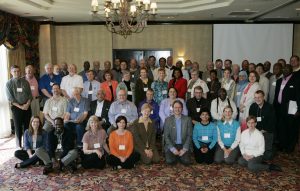
2005
The Johnson Institute Staff
Johnson Institute Staff at the National Faith Leader Summit in 2005. This was the result of the merger between Johnson Institute, Rush Recovery Institute, and Faith Partners that allowed us as an organization to further develop our educational materials, training series, and relationship with state and federal funding. We had offices in Austin, Texas; Minneapolis, Minnesota; and Washington D.C. to expand our reach across the United States.
2004
Merger with Johnson Institute
At a Faith Partners board meeting in 2003, Johnny Allem (middle of this photo), President of Johnson Institute proposed a merger and a new entity was soon created. In 2004. Faith Partners Inc began a five-year working agreement with Johnson Institute – a simultaneous merger of the Rush Recovery Institute, which developed expertise in knowledge, assessment and training of clergy in addiction issues, led to the formation of the Rush Center of the Johnson institute. This milestone event, with its expansion of knowledge, resources, and experience, propelled the Rush Center into a period of energetic activity and growth.
1999-2002
Demonstration Project
The late 1990s were busy with further development and refinement of the congregational team approach as Faith Partners collaborated with the Johnson institute and the Minnesota Institute of Public health for a three-year multi-site demonstration project to showcase the concept in Minnesota and Texas and later expanded to Ohio and Oklahoma.
An invaluable relationship was also developed with the Substance Abuse and Mental Health Service Administration (SAMHSA) of the Department of Health and Human Services, which has been a significant participant in supporting and funding various stages of work since 1998.
1999
Ministry Manual Developed
Trish Merrill with colleague Roger Svendsen from the Minnesota Institute of Public Health (MIPH), as well as Johnson Institute helped in the development of a 234-page Faith Partners manual, “Building a Team Ministry; A Congregational Approach to Substance Abuse”. This manual incorporated the ADEPT model and Merrill’s best thinking after several years of effort. The manual was made possible through a grant from the Trull Family Foundation, Johnson Institute, and the Central Center of Prevention Technologies (CAPT).
By publishing it, Faith Partners hoped to provide congregations the tools and guidance they need in order to get involved. By distributing the manual and offering training nationally, Faith Partners hoped to let concerned members within faith communities know there is something they can do in substance use prevention and supporting the recovery of those who were afflicted or affected by addiction.
1995
Faith Partners is Incorporated
Faith Partners, Inc. was founded in 1995 in Austin TX by religious leaders seeking ways to mobilize the resources of the faith community to address alcohol and drug issues.
Trish Merrill, the creator of Project ADEPT, which served Texas congregations from 1990-1995, becomes the founder of Faith Partners. She pioneered chemical dependency training for members of religious organizations and developed strategies for building teams to provide substance abuse ministry within their congregations. Faith Partners received a Certificate of Incorporation by the Secretary of the State of Texas in 1995 and shortly after established Non-profit 501(c)(3) status.
1994
National Council of Churches Award
The approach Faith Partners Inc took, the team ministry concept, had been in development over several years. A step by step manual, Building a Team Ministry, was developed based on this statewide project and the work was recognized by the National Council of Churches of Christ (NCCC) in 1994.
This five-year experimental program, Project ADEPT (Alcohol and Drug Education in the Parishes of Texas), laid the groundwork for what would emerge as the Faith Partners model.
1987
Genesis in Austin
The Faith Partners concept was several years in development. Trish Merrill began training parish teams in Austin, Texas, in 1987, based on a model developed by Parkside Hospital in Chicago. In 1990, with a grant from the Texas Commission on Alcohol and Drugs, she replicated the Austin model of congregational teams under the auspices of the Texas Conference of Churches. Working with more than 200 congregations between 1990-1995. She earned that the most effective teams were cross-sections of the congregation – not just persons in recovery – which required equipping with training, tools, and materials for carrying out their work.

